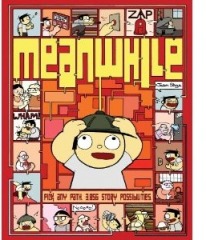I'm familiar with several mediums of interactive text, but it seems each is stereotyped by outsiders. In some cases, the stereotypes are fairly accurate of what has been done in that medium up until now. However, I believe that none of the mediums are as flawed as they are made out to be, just that new works in each tends to be like previous works, forming flawed genres within the medium.
Here are the stereotypes as I perceive them:
Choice-based fiction (CYOA). "Adventure or fantasy genre, written for teens. Arbitrary choices, most of which lead to death. 'Lawnmowering' through each choice branch to find content or endings."
Interactive fiction. "Ugly text. Funky command line interface. 'I don't understand that command.' Examine everything, pick up everything, try everything."
Graphic adventures. "Over-clever dialogue and descriptions, self-referential or in-joke humor. Illogical puzzles. Fetch quests and favor trading. Examine everything, pick up everything, try everything with everything."
Tabletop RPGs. "Fantasy genre. Lots of dice. Nerds in their moms' basements, arguing about whether a Level 14 Elf Mage could actually go two weeks without pooping if he ate only lembas wafers."
MMORPGs and MUDs. "Same as above, but in
leetspeak."
Video game RPGs. "Fantasy genre. Unite the 12 Lightshards of the Everglow to defeat Horribus McDarknasty. Fetch quests and favor trading. Grinding. Menu-choice dialogue, and people standing around saying '...' to each other."
Hypertext. "Artsy-fartsy 'literary' writing. Passages joined by link spaghetti. No progress or ending."
Visual novels. "Visual what?"
Video games. "BOOM! BOOBS! THREE DIFFERENT ADRENALINE-DRENCHED ENDINGS!"
Most of these could be lampooned indefinitely, but I think that generally covers it. Comment if there's a medium I left out.
Obviously, I stereotyped these so as to make my point, but I do think most people's objections to an interactive text medium lie with the genres it has become associated with, not with the medium itself.
Fans of IF might complain that CYOA has no world model, only a pruned branching structure, but I think if an interesting story with developed characters were written as a choice-based novel for a good reason, they could appreciate it as much as a static novel (still wouldn't scratch their IF itch, I understand). Similarly, it's not that IF outsiders aren't interested in fiction set in a fully-modeled text world, they just aren't interested in ones about "you" having to pick up everything, etc. (and maybe not interested in learning the command line interface, though I argue IF can be defined more fundamentally than that).
Many complain that mainstream video game titles are just carbon copies of each other with the newest graphics and hardware. But the truth is, each kind of interactive text is almost as locked into their genres and types – and the game engines and input methods haven't updated since the 70s.
I think each of these mediums could learn and borrow from some of the others to create an attractive experience for new readers and players. Some examples already attempting this:
Jeepform RPGs like
A Bitter Aftertaste that create a literary narrative, similar to improv theater;
Sweet Agatha, a book that is physically taken apart and told interactively to a listener; and
Choice of Games CYOA stories, written in several unusual genres, with interesting informed choices and personality stats that affect gameplay.
Not everything will work, but if what we're doing now isn't as successful as we'd like (for whatever definition of success), it's time to try something new – and why not start with popular elements from other mediums?



 RSS Feed
RSS Feed